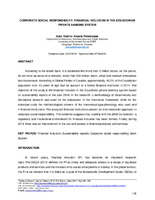| dc.rights.license | Licencia de Creative Commons Reconocimiento-NoComercial-CompartirIgual 4.0 Internacional (CC BY-NC-SA 4.0) | |
| dc.creator | Acosta Palomeque, Galo Ramiro | |
| dc.date.accessioned | 2020-06-26T21:34:31Z | |
| dc.date.available | 2020-06-26T21:34:31Z | |
| dc.date.issued | 2019-01-01 | |
| dc.identifier.citation | Acosta Palomeque, G. R. (2019). Corporate social responsibility : financial inclusion in the ecuadorian private banking system. Visión de Futuro, Revista Científica. Posadas (Misiones): UNaM. FCE. PPA; 23(1), 138-156. | |
| dc.identifier.issn | 1668-8708 | |
| dc.identifier.other | VF-006 | |
| dc.identifier.uri | https://hdl.handle.net/20.500.12219/2482 | |
| dc.identifier.uri | https://doi.org/10.36995/j.visiondefuturo.2019.23.01.003.en | |
| dc.identifier.uri | https://visiondefuturo.fce.unam.edu.ar/index.php/visiondefuturo/article/view/302/116 | |
| dc.description | Fil: Acosta Palomeque, Galo Ramiro. University of the Armed Forces ESPE. Department of Economic, Administrative and Trade Sciences; Ecuador. | en |
| dc.description.abstract | According to the World Bank, it is estimated that more than 2 million adults, on the planet, do not have an account to transact, more than 200 million micro, small and medium enterprises lack businesses. According to Global Findex in Ecuador, approximately, 46.2% of the Ecuadorian population over 15 years of age had an account in a formal financial institution in 2014. The objective of this study is the financial inclusion in the Ecuadorian private banking system based on sustainability reports of the year 2016. In the research, a methodology of documentary and descriptive research was used for the elaboration of the theoretical framework, while for the empirical study the methodological scheme of the transversal-type phenology was used and 4 financial institutions. The analyzed financial institutions present an instrumentalist approach to corporate social responsibility. The evidence suggests that, starting with the 2008 Constitution, a regulatory and institutional environment for financial inclusion has been formed. Finally, during 2016 there was an improvement in the use and access to financial products and services. | en |
| dc.format | application/pdf | |
| dc.language.iso | eng | en |
| dc.publisher | Universidad Nacional de Misiones. Facultad de Ciencias Económicas. Programa de Posgrado en Administración | es_AR |
| dc.rights.uri | http://creativecommons.org/licenses/by-nc-sa/4.0/ | |
| dc.source | Visión de Futuro (Misiones), 1-2019; 23(1): pp. 138-156. https://visiondefuturo.fce.unam.edu.ar/index.php/visiondefuturo/index | |
| dc.subject | Financial inclusion | en |
| dc.subject | Sustainability reports | en |
| dc.subject | Corporate social responsibility | en |
| dc.subject | Bank System | en |
| dc.title | Corporate social responsibility : financial inclusion in the ecuadorian private banking system | en |
| dc.type | info:eu-repo/semantics/article | |
| dc.type | info:ar-repo/semantics/artículo | |
| dc.type | info:eu-repo/semantics/publishedVersion | |




